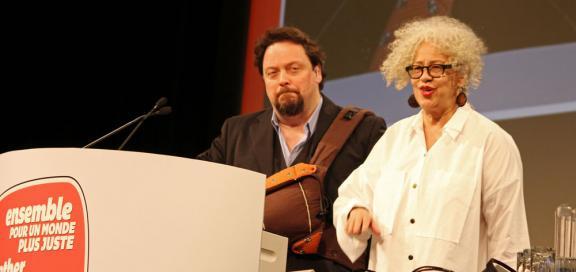Last night a star-studded cast of ACTRA members entertained and informed Canadian Labour Congress convention delegates on the issue of child care.
The “Let’s Rethink Child Care” forum started with this video, produced by the Rethink Child Care campaign:
With the tone set, actors Lynne Adams, Tabby Johnson, Nicole St. Martin, Alvin Saunders and Jeremy Webb performed humorous and thought-provoking skits by “Little Mosque on the Prairie” actor and writer Deb McGrath. The skits showed challenges parents face getting their kids into limited child care spaces, paying the often exorbitant fees, and working jobs that don’t allow them to balance their work with family time and responsibilities.
Tabby Johnson and Jeremy Webb emceed the evening as well as performing.
“Childcare isn’t just a women’s problem,” said Johnson. To demonstrate this, she asked people in the audience to stand if they’re directly impacted by childcare issues, if they have coworkers or family who are, if they’ve ever been asked to look after someone’s kids at the last minute, or if they plan to have children. By the end, practically everyone in the audience was standing.
In between skits, child care advocates gave short speeches about their experience fighting for quality, universal, public child care across Canada.
First was CUPW member Jamie Kass. At age 62, she has spent her entire working life fighting for a national childcare program.
“Nearly four in five children are still out of luck finding regulated childcare,” she said, noting the situation is worst for Canadians in rural areas, First Nations communities and parents with infants.
Despite the need for quality childcare and the importance of the job, the average wage in Canada for a child care worker is approximately $26,000 a year.
Kass said it’s time for us to work together to “see a change in government and the beginning of a national child care program” in 2015.
Next, Sylvie Lévesque, directrice générale of the Fédération des associations de familles monoparentales et recomposées du Québec (FAFMRQ) (right) spoke about the successes of the universal child care program in Quebec.
One of the biggest changes since Quebec brought in universal child care in 1997 is that 70,000 more women have been able to find jobs.
“These are women who pay taxes and are active and contribute to the general economy,” said Lévesque. Because universal childcare enables so many more parents to enter the workforce and contribute to the economy, it more than makes up for the costs to government, FAFMRQ says.
Lévesque’s only caveat is that the program in Quebec still doesn’t work as well to parents with atypical needs, such as those who work precarious or part-time work. Her group and others in Quebec are working to get changes implemented to make the program more flexible, but overall feel very lucky compared to the rest of Canada.
Before the final speaker, the emcees connected child care to our role as unions.
“Why is this a union issue? Because unions understand the idea of collective responsibility,” Johnson said.
“Childcare supports union members to be at work. When you’re not worried about your childcare, you’re more productive at your job,” added St. Martin. They urged union leaders to speak with members and let them know “you stand in solidarity with them in their struggle to get childcare.”
Reinforcing the importance of union involvement and coalition-building was Dominique Arbez of the volunteer-run Childcare Coalition of Manitoba (CCAM), who spoke about the situation in her province, which is defined by an all too familiar crisis: lack of access to quality childcare spaces.
Arbez talked about her coalition’s work bringing diverse parents together to share their experiences and push for solutions. The CCCM has built bridges with the Canadian Federation of Students in Manitoba, the Manitoba Federation of Labour and many of its affiliates, and community groups.
“When you have a common vision you have more strength. It’s important to share principles,” Arbez said.
Finally, the emcees sent the audience away with a call to action to help ensure federal parties make child care a key issue in the next election.
“We’re going to need the help from each and every one of you,” they stated, listing actions everyone could take:
- Take a picture holding a sign saying why you think we need to #RethinkChildcare, and post it on social media using that hashtag (forum participants used the sign pictured right).
- Talk to a politician and tell them your story and that your vote depends on their willingness to make the issue of child care a priority.
- Visit rehinkchildcare.ca for more ways to get involved.
Note: For more information on what MoveUP is doing on the issue of universal child care, read about the $10/Day Child Care Plan, a proposal from the Coalition of Child Care Advocates of B.C. MoveUP has publicly endorsed this plan.



